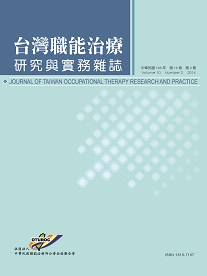Journal of Taiwan Occupational Therapy Research and Practice

半年刊,正常發行
目的:本研究主要目的為探討亞急性缺血型中風病患之血糖標記與功能成效之間的關 係,並檢驗職能治療對於血糖及功能指針的影響。方法:共募集 13 位缺血型中風患者參 與研究,每位患者接受為期 4 周 1 對 1 的復健治療。成效評量工具包含:修正版 Rankin量 表 (modi ed Rankin Scale, mRS)、 傅 格 梅 爾 評 估 量 表 (Fugl-Meyer Assessment, FMA)、功能獨立量表 (Functional Independence Measure, FIM) 及中風影響量表 (Stroke Impact Scale, SIS)。血糖標記包含飯前血糖數值 (fasting blood glucose) 及糖化血色素指 數 (glycosylated hemoglobin, HbA1c)。受試者於治療前及後接受所有成效評估工具之施 測。結果:治療後,發現中風患者的 mRS 分數與飯前血糖數值間具有顯著相關性 (rho = .72, p < .05),表示若患者失能程度愈低(意即功能愈佳),則其血糖數值愈低。而治療 前的飯前血糖數值與治療後患者的 mRS 及 FIM 分數呈現顯著相關性 (rho = .60 and –.70; p < .05),代表血糖值可能具有預測患者失能程度的潛在價值。另外,病患接受治療後, 所有功能性成效指針皆顯著地改善 (p < .05),且糖化血色素數值亦在治療後顯著的下降 (p = .01)。結論:此初步研究結果顯示,患者較低的血糖數值和失能程度改善之間呈現顯著 的相關,因此,建議在中風復健的歷程中有必要持續監控病患的血糖指數及狀態。未來研 究則需以較大的樣本對此研究結果再加以驗證。
Objective: This study investigated the relationship between glycemic markers and functional outcomes and examined the effects of occupational therapy on these outcomes in patients with subacute ischemic stroke. Methods: Thirteen patients with ischemic stroke were recruited. They received one-on-one occupational therapy for 4 weeks. Outcome measures included the modified Rankin Scale (mRS), Fugl-Meyer Assessment (FMA), Functional Independence Measure (FIM), and Stroke Impact Scale (SIS). Glycemic markers were levels of fasting blood glucose and glycosylated hemoglobin (HbA1c). Before and after the intervention, all outcome measures were administered to the participants. Results: Aftertherapy, a signi cant correlation of the mRS with blood glucose (rho = .72, p < .05) represents less disability related to lower level of the marker. Baseline blood glucose was significantly correlated with post-treatment scores on the mRS and FIM (rho = .60 and –.70; p < .05), which indicates its potential value in predicting disability outcomes. After therapy, all functional outcomes were significantly improved (p < .05). There was a significant decrease on the HbA1c level after therapy (p = .01). Conclusion: Based on the preliminary results, lower blood glucose levels were significantly associated with improved disability outcomes in patients which suggests that glycemic status could be monitored along with functional outcomes in stroke rehabilitation process. Further research with a large sample is needed to validate thesendings.












